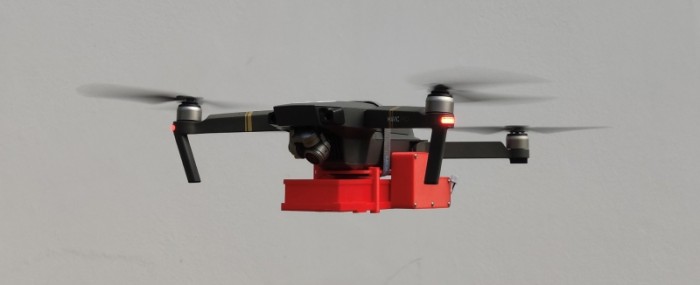
Brazilian startup develops drones that fight the spread of dengue by releasing sterile Aedes mosquitoes
02 de fevereiro de 2024By Elton Alisson | FAPESP Innovative R&D – A technology originally designed for spraying crops with biological pest control products can be used in urban environments to reduce proliferation of insects that carry viruses harmful to humans, such as the mosquito Aedes aegypti, which transmits dengue, yellow fever, zika and chikungunya.
Developed by BirdView, a startup based in São Manuel (São Paulo state, Brazil), in collaboration with EMBRAPA Instrumentation – one of several decentralized units of the Brazilian Agricultural Research Corporation (EMBRAPA) – and with support by FAPESP’s Innovative Research in Small Business Program (PIPE), the solution was tested and is currently under the validation process of the International Atomic Energy Agency (IAEA).
The nuclear watchdog of the United Nations (UN) has developed a method for sterilizing mosquitoes by irradiation and is coordinating a technical cooperation program with countries interested in using the technology.
“We carried out tests to validate the technology by the International Atomic Energy Agency with Aedes and Glossina [popularly known as tsetse fly], which is responsible for the transmission of sleeping sickness. The preliminary results are very encouraging,” says Ricardo Machado, co-founder of the startup.
The test to validate the technology in the fight against Aedes in partnership with the IAEA was carried out in 2002 in Seibersdorf, Austria, where the laboratory of the technique developed by the agency for pest control is located. In the same year, the company carried out other tests in the Brazilian states of Paraná and Pernambuco.
“We also conducted a test in Florida in partnership with an agency responsible for the control of arboviruses in that US state,” says Machado.
More efficient technology
The technology, which the firm developed under the aegis of the FAPESP Research Program on Biodiversity Characterization, Conservation, Restoration and Sustainable Use (BIOTA), is a drone-mounted modular system that holds the insects in a special container and releases them in previously demarcated areas, minimizing damage and stress that might cause the death of the insects, changes in flight characteristics or reproduction capacity.
When used over farmland, the drone releases insects onto crops to combat agricultural pests that are their natural enemies. When used over urban areas, it releases sterile males of A. aegypti, which even when mating will not have offspring. Females of this species reproduce once in their entire lifetime. The solution will reduce local populations of A. aegypti, experts believe.
The method has been used for decades to control agricultural pests such as the Mediterranean fruit fly, the false moth, the New World worm and the tsetse fly.
A small drone has the capacity to release 17,000 insects per flight, which lasts 10 minutes and covers an area of 100,000 square meters. In this way, it is possible to release almost 300,000 insects per day, the engineer explains.
“Another limitation of the release of sterile mosquitoes by the terrestrial method is that it is restricted to public roads, not reaching foci of the insect. The drones allow the release in a homogeneous way and with low stress induced in the insect”, compares Machado.
According to him, the method of air-releasing sterile Aedes aegypti makes it possible to reduce 90% of the population and new cases of the disease in three to four weeks. In the case of land release, these rates are reached between three and four months.
“Drone release is much faster, it makes it possible to launch larger quantities of insects and in a more homogeneous way. This is reflected in more treated sites,” he says.
According to Machado, drones are low cost and easy to operate. In addition, they were designed to carry out the release of the insects in the cities in a decentralized manner, according to the surveillance strategies adopted by local health agents.
“The solution can also be used to sow seeds for the restoration of forests and the Wolbitos produced by Fiocruz [Oswaldo Cruz Foundation, a federal agency for the development of health inputs, technologies and scientific research] in partnership with the Ministry of Health,” says Machado, referring to a program recently announced by the two institutions that aims to expand access in Brazil to mosquitoes with Wolbachia.
Already introduced in 12 countries, the technology consists of introducing a bacterium – called Wolbachia – into mosquitoes that prevents them from transmitting dengue and other viruses transmitted by Aedes aegypti.
PIPE Entrepreneur
BirdView was one of 21 startups that took part in the 25th edition of PIPE Entrepreneur. The technical validation and business results they obtained during the 12-week course were presented at an event held in December at FAPESP.
One of the main aims of PIPE Entrepreneur is to build closer ties between academia and the market. According to program coordinator Cátia Favale, the participating startups need to validate their projects with models that are attractive to the market. “We want to convert efforts into business ventures. It’s a win-win, boosting tax revenue, job creation, income, and economic and social development,” she said.
“PIPE Entrepreneur is considered one of the leading business training programs in São Paulo, with highly qualified coordinators, mentoring, and a sound methodology,” said Anapatrícia Morales Vilha, a member of FAPESP’s Research for Innovation Adjunct Panel.
